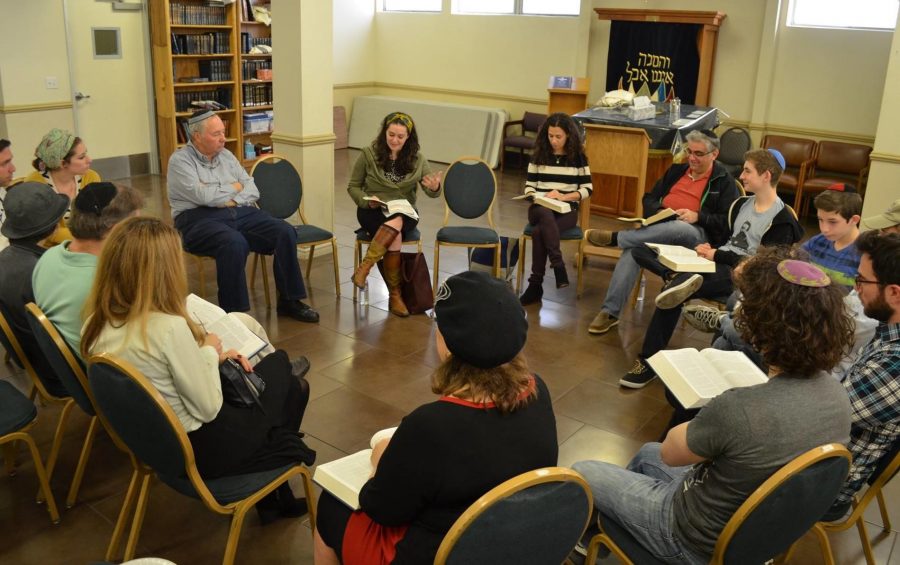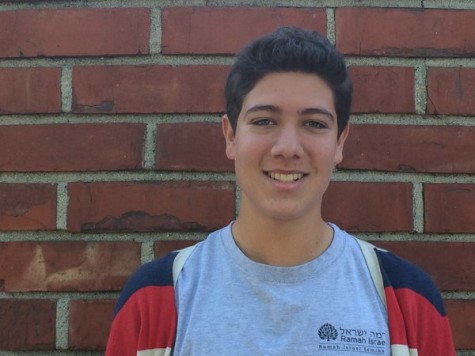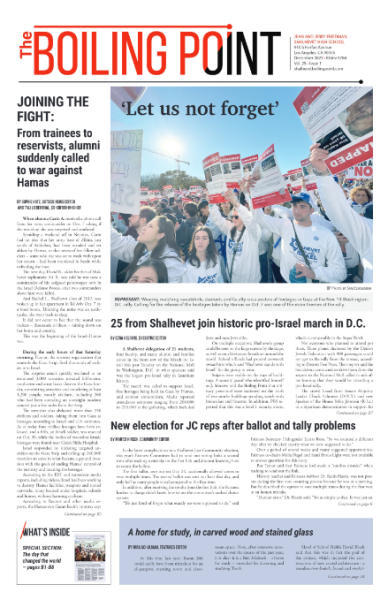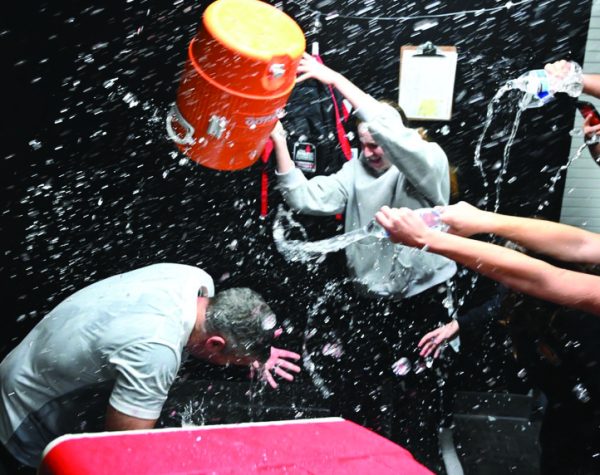Compromise on female clergy saved community-wide ‘Day of Learning’ last fall
LEARNING: Judaic Studies teacher Mrs. Ruthie Skaist gave a workshop at Beth Jacob Congregation Nov. 16. Bnai David-Judeas kehilla intern Alissa Thomas-Newborn was not allowed to speak there.
February 11, 2015
When B’nai David-Judea Congregation on Pico Boulevard appointed its first-ever kehilla intern last fall, the congregation received her with open arms.
Alissa Thomas-Newborn, a fourth-year student in the clergy ordination program at Yeshivat Maharat in New York, is the first woman to intern there, following three male interns, all rabbinical students. Her appointment was made when the shul’s rabbi and board decided to add an additional member of clergy to its staff.
But in November, her presence – or perhaps just her title — almost derailed a collaborative day of Jewish learning that had been planned jointly by the Shalhevet Institute and B’nai David-Judea, Beth Jacob Congregation, and Young Israel of Century City.
The event was set for Sunday, Nov. 16, at Beth Jacob, as part of an annual worldwide gathering of communities who decide to all learn Torah on the same day. This year, over 420 communities in 40 countries participated. The topic was “Heroes & Villains, Saints & Fools: The People in The Book.”
Led by Rabbi Ari Schwarzberg, Director of the Shalhevet Institute, seven speakers were arranged: Rabbi Judah Mischel, Rabbi Pini Dunner, Rabbi Yitzchak Etshalom, Rabbi Abraham Lieberman, Rabbi Avroham Stuhlberger, Ms. Thomas-Newborn, and Shalhevet Judaic Studies teacher Mrs. Ruthie Skaist. All were to appear at Beth Jacob.
Although no rabbis would share details for the record, The Boiling Point has learned that when Beth Jacob Rabbi Kalman Topp learned that Ms. Thomas-Newborn would be speaking, he said his synagogue would withdraw its sponsorship. Mrs. Skaist was not an issue.
Marc Rohatiner, past president of Beth Jacob and a Shalhevet alumni parent, said Rabbi Topp and Rabbi Muskin were cautious about having her speak because of how her title, maharat, might be perceived, and felt there was not enough time to prepare their congregations. The amount of time involved was not clear.
“All I am aware of is how the timing came up, and not being sensitive to how Rabbi Topp and Rabbi Muskin would have to deal with the issue, and be able to deal with it in the context and deal with the leadership,” Mr. Rohatiner said.
A stalemate persisted for several weeks, during which there was no publicity for the event. With two weeks to
go, Rabbi Schwarzberg met with Rabbi Muskin and Rabbi Kanefsky and tried to reach a solution, but they were unsuccessful.
Eventually it looked as if it was going to be canceled, and the fifth-largest Jewish community in the world was not going to participate in the international Global Day of Jewish Learning.
Finally, during the first week of November, Rabbi Schwarzberg and YULA Rabbi Yitzhak Etshalom came up with the idea to have B’nai David host part of the event, including Ms. Thomas-Newborn’s address. This meant splitting the program into two locations, but apparently satisfied everyone’s concerns.
The event went forward, and Ms. Thomas-Newborn gave a talk at B’nai David called “Higher and Higher: An Exploration of Sanctity and Jewish Law.”
With the immediate conflict resolved, the rabbis declined to discuss the details, perhaps not wanting to unravel the tenuous unity they had forged.
“We are very happy regarding how the day of learning played out,” Rabbi Topp said in an interview. “We had a multiplicity of learning blessed with many great teachers both men and women.”
Asked why Ruthie Skaist could speak at Beth Jacob and not Ms. Thomas-Newborn, Rabbi Topp responded, “I think that was an internal conversation with the organizers of the program and it’s hard for me to say more than that.”
Rabbi Muskin acknowledged an issue had occurred but would not go further. Rabbi Kanefsky would only confirmed the account of the events.
But Mr. Rohatiner said the problem had not been a woman’s speaking to the gathering. Rather, he said, it was that some thought Ms. Thomas-Newborn was becoming a rabbi.
“The issue was that because of an article in The Jewish Journal that had just come out, the perception was that B’nai David Judea was hiring a woman rabbi,” Mr. Rohatiner said in an interview.
“You have to expect that when this comes up, there are going to be people who say ‘How can we have a woman rabbi speaking?’” he explained. “Rabbi Topp was not saying no to the concept.”
When it was over, there was relief that a split in the community had been averted – for now.
“I think there was a paradise lost by having two venues, but in the end, the fact that the community was able to come together and learn is a really beautiful thing, and I am really proud that the Shalhevet Institute was able to present to this to our community,” said Rabbi Schwarzberg.
“The hope is for next year to broaden the program to the larger Jewish Community in LA and for the day to be a great opportunity for Jews to come together and learn with one another.”
Ms. Thomas-Newborn, meanwhile, was aware of the controversy and happy it was resolved.
“What mattered most to me was being able to teach and to come together and teach as a community,” said Ms. Thomas-Newborn. “I applaud Shalhevet for making that happen and I was honored to teach.”
“For me, the drama and the politics, they happen. What I really care about is serving the need and helping people connect with Torah, and to each other, and with God.”
Mrs. Skaist strongly supported her.
“We constantly talk about how in the workplace women should be equal to men, but in our spiritual places women don’t have a carved-out place,” Mrs. Skaist said. “It is beyond gender. People at Yeshivat Maharat are quite capable and filling a void. I am a huge supporter. I think there is no reason not to have women leaders in our community.”
At B’nai David, Rabbi Kanefsky thinks the long-term outlook – for women’s leadership and for Orthodox unity – is good.
“I think the broader community will see the value of having folks like Alissa in our community,” Rabbi Kanefsky said.
Related: In a first for Los Angeles, B’nai David adds a clergy intern who is female
Related: Female ordination a ‘ruse,’ says spokesman for Agudath Israel














